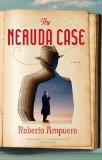Summary | Excerpt | Reviews | Beyond the Book | Readalikes | Genres & Themes | Author Bio

A Novel
by Roberto Ampuero
"Here you go," the goth announced as she unfolded a menu containing full-color photos of the sandwiches and pastries served at the café.
The menu aimed not only to whet the customers' appetite but also to give a sense of culture, as it tried to describe the marvelous history of that city with seven lives, known as the "Jewel of the Pacific." Strictly speaking, the gem in question was quite worn down - it had not been founded by any official authority, civil or ecclesiastical, and now had half a million long-suffering inhabitants in its fifty teeming, anarchic hills. A horseshoe bay formed a dazzling amphitheater, and people risked their lives on shabby postwar trolleys and a handful of whining cable cars each time they rode to work or to homes with crumbling balconies and gardens that settled gracefully on peaks or clung precariously to hillsides. Declared a World Heritage Site by UNESCO in honor of its architecture and topography, Valparaíso now began, once again, to show signs of recovery, thanks to retired North Americans and Europeans who, dressed like adolescents and with pockets full of dollars and euros, disembarked en masse from cruise ships that arrived every day during the summer.
It wasn't a bad life in Valparaíso, he thought with satisfaction. He rented a yellow house, in the neo-Victorian style, on Gervasoni Avenue, on Concepción Hill, and from there he could gaze at the Pacific and, on warm and pristine summer mornings, even imagine he was in Havana, frolicking in the currents of the gulf, with the Malecón breeze at his back. In his work as a private investigator, he had the help of a man named Suzuki, a porteño of Japanese origin who spent his nights attending to the Kamikaze, a modest, tiny fried-food stall that he owned. It was in the port district, between the plazas Aduana and Matriz, on a narrow street lined with cobblestones and bars, which allowed him to stay abreast of the murmurs of whores and their pimps, who now again enjoyed, along with pickpockets and muggers, the generous fruits of tourism. Though already in his fifties, Cayetano still believed he might one day find the woman of his dreams and become the father of a little boy or girl (it didn't matter which, as long as the child was healthy) before going completely bald and becoming an arthritic, cantankerous retiree. And if in the beginning it had been hard for him to adapt to the severity of Chileans and the rigorous climate of its mountainous land, now the island of Cuba, its people, and its weather were more of a pale and distant evocation, because his new homeland, with all its light and shadows, had ended up conquering him, despite the fact that it was neither green nor an island, unless, perhaps, it was, just in a different way.
"Have you decided what to eat?" the goth asked as she served his coffee. She had translucent arms, riddled with thick blue veins.
"A Barros Luco with extra avocado," he said, and tried to imagine what it would be like to glide his fingertip along those blue lines until he reached her perfumed, hidden slopes.
And it was after he had sweetened his drink and tasted it that his gaze fell upon the back of the menu, with its photo of Pablo Neruda on a sofa in his Valparaíso home. He felt his heart freeze, sipping espresso slowly until the lenses of his glasses steamed up, and smiled faintly. It suddenly seemed that the palms, the crosses of the mausoleums on the summit, and even Neptune himself had begun to vibrate like mirages in the desert. His memory transported him to that winter morning in 1973 when he began his first investigation, which he never disclosed to anyone, as it was the most closely guarded secret of his life, the secret he'd still carry as they took him up the hill, feet first, to that cemetery where the dead, on warm summer nights, swung their hips joyfully to the rhythm of tangos, cumbias, and boleros, longing for the next earthquake to hurl them back down to the picturesque and winding streets of Valparaíso.
Excerpted from The Neruda Case by Roberto Ampuero. Copyright © 2012 by Roberto Ampuero. Excerpted by permission of Riverhead Books. All rights reserved. No part of this excerpt may be reproduced or reprinted without permission in writing from the publisher.
Your guide toexceptional books
BookBrowse seeks out and recommends the best in contemporary fiction and nonfiction—books that not only engage and entertain but also deepen our understanding of ourselves and the world around us.